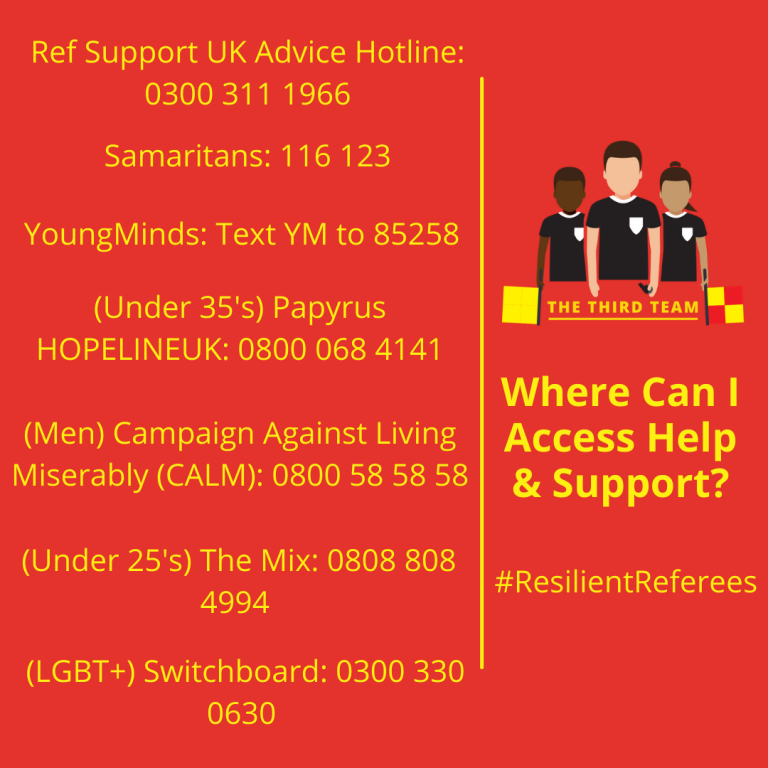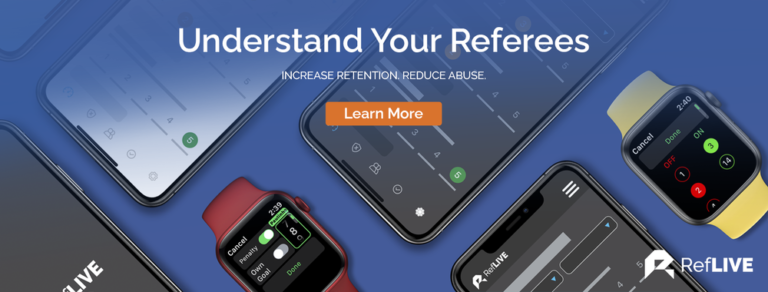Time away from the middle, while hopefully infrequent, is often an unavoidable part of being a referee. While most absences can be managed with little to no disruption to overall fitness and other activities of daily living, some impose a substantial physical and mental burden. For younger officials, in particular, the psychological response to inactivity can trigger or unmask serious mental health issues such as depression, anxiety, disordered eating, and substance use or abuse.
When a referee is experiencing a period of enforced absence, such as being injured, there is a normal emotional reaction that includes processing the medical information about the injury provided by the doctors or physiotherapists, as well as coping emotionally with the injury.
These emotional responses can include:
- Sadness
- Isolation
- Irritation
- Lack of motivation
- Anger
- Frustration
- Changes in appetite
- Insomnia
- Disengagement
How officials may respond to a period away from the pitch can differ, and there is no predictable sequence or reaction. The response to absence extends from the time immediately after the break begins through to the irritation of not being able to be active and ultimately with return to action. Following most absences, the referee is able to return to pre-break levels of activity. Your personal or your group physician is ultimately responsible for the return-to-action decision, and addressing psychological issues is a significant component of this decision.
It’s important for referee coaches, managers and group physicians, as well as the officials themselves and administrators, to understand that emotional reactions to periods of inactivity are normal. However, problematic reactions are those that either do not resolve or worsen over time, or where the severity of symptoms seem excessive.
Persistent Symptoms
- Alterations of appetite
- Sleep disturbance
- Irritability
Worsening Symptoms
- Alterations of appetite leading to disordered eating
- Sadness leading to depression
- Lack of motivation leading to apathy
- Disengagement leading to alienation
Excessive Symptoms
- Verbal and nonverbal behaviors that indicate the individual is experiencing high levels of pain
- Excessive anger or rage
- Frequent crying or emotional outbursts
- Substance abuse
One troubling reaction is when inactive officials restrict their caloric intake because they feel that since they are sidelined, they “don’t deserve” to eat. Such a reaction can be a trigger for disordered eating. When a referee is already at risk for disordered eating, this problematic reaction only heightens the likelihood these unhealthy behaviors will worsen. During the Coronavirus pandemic, the rate of people developing eating disorders has risen by 400% in the United Kingdom.
Another unfortunate response to a layoff is depression, which magnifies other responses and can also impact a referee’s return to action. Depression in some officials may also be related to performance failure. When referees sustain significant injuries, such as knee injuries associated with time loss from sport, they can suffer both physically as well as emotionally with a decrease in their quality of life.
In other sports, former Olympic skier Picabo Street sustained significant leg and knee injuries in March 1998, she battled significant depression during her recovery:
“I went all the way to rock bottom. I never thought I would ever experience anything like that in my life. It was a combination of the atrophying of my legs, the new scars, and feeling like a caged animal.” – Picabo Street, Former Olympic Skier
Street ultimately received treatment and returned to skiing before retiring.
Kenny McKinley, wide receiver at the Denver Broncos, was found dead as a result of a self-inflicted gunshot wound in September 2010 after becoming disconsolate following a knee injury. He had undergone surgery and was expected to be sidelined for the entire season. He had apparently made statements about being unsure what he’d do without American football and began sharing thoughts of suicide.
These case examples demonstrate how injury can trigger significant depression and suicidal ideation.
Seeking Treatment
Sidelined referees who are having a problematic psychological response to being unable to officiate may be reticent to seek treatment. They may be afraid to reveal their symptoms, may see seeking counseling as a sign of weakness, may be accustomed to working through pain, may have never had to struggle, and may not have developed healthy coping mechanisms to deal with failure. In addition, many referees have not developed their identity outside of that as an athlete. Thus, if this role is threatened by a layoff, they may experience a significant “loss.” Getting an official to consider treatment can be challenging (and it is complicated by privacy issues), so coaches, referee managers and group medics as the support network for the referee should work together to provide quality care.
As a referee coach or group medic, it’s important to be aware of common signs and symptoms for various mental health issues and understand the resources available to treat them. Those personnel also must do everything possible to “demystify” mental health issues and allow officials to understand that symptoms of mental health issues are as important to recognise and treat as symptoms for other medical issues and musculoskeletal issues.
It’s also important for coaches, referee managers and group medics to support inactive referees and do what they can to keep officials involved and part of the group of officials. This might include keeping referees engaged, and at the same time encouraging them to seek help and not try to “tough their way through” situations that include mental health factors.
For referee coaches, one of the most powerful actions is to “give the referee permission“ to seek treatment. This is often incredibly helpful in encouraging officials to seek care. Having programs available to educate referees.
It is important to understand the mental health resources available in each county and region and consider both early referral to provide care for mental health issues in referees. If this can be incorporated into the overall goal of optimising performance, along with nutrition and strength and conditioning, it may be better received by officials and coaches, thereby increasing the co-operation with management and treatment.
Given all that is known about mental health issues in referees, and the role of inactivity and the barriers to treatment, the bar is raised in terms of what referee managers and group medics can do in the future. Having a comprehensive plan in place to screen for, detect and manage officials with a troublesome response to time away from officiating is an important first step.
Suggestions For Referee Coaches & Referee Managers
- Understand both common psychological responses to injury as well as problematic responses.
- Communicate with the referee development team regarding inactive officials, and work to include them in development sessions when possible.
- Understand the mental health resources available to referees as well as the role of referee coaches and managers in expediting referrals. Be supportive of seeking care for mental health issues.
If you find yourself in distress, then take a look at the image below. There you will find links to a number of listening support services, choose the one specialist to you and your needs:

At The Third Team I work individually and in collaboration with different professionals where I have developed workshops associated with Resilience and Mental Toughness Development to help referees. The workshops are interactive, where referees are encouraged to open up and share their experiences to help each other.
Feel free to contact me if you’d like to know more about my workshops and how I could help you or your officials.
Best Wishes,

Nathan Sherratt
Referee Educator & Managing Director of The Third Team

Nathan Sherratt
Nathan Sherratt, Referee Educator, Resilience Trainer and Managing Director of The Third Team. A Mental Toughness Practitioner based in County Durham, North East England.


